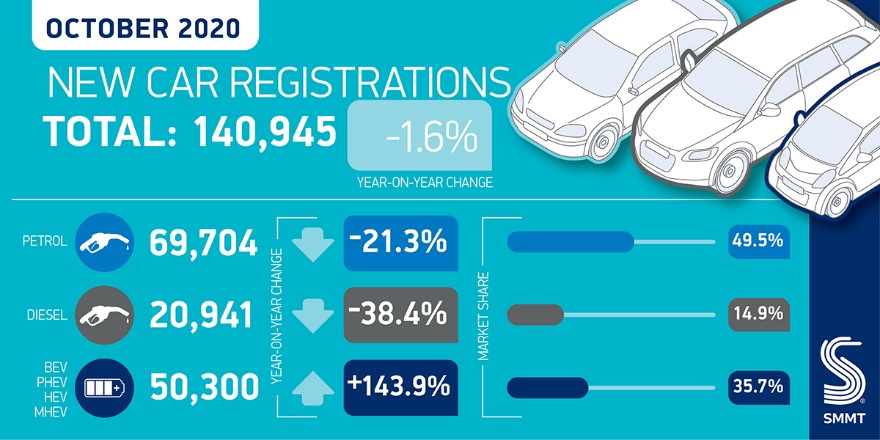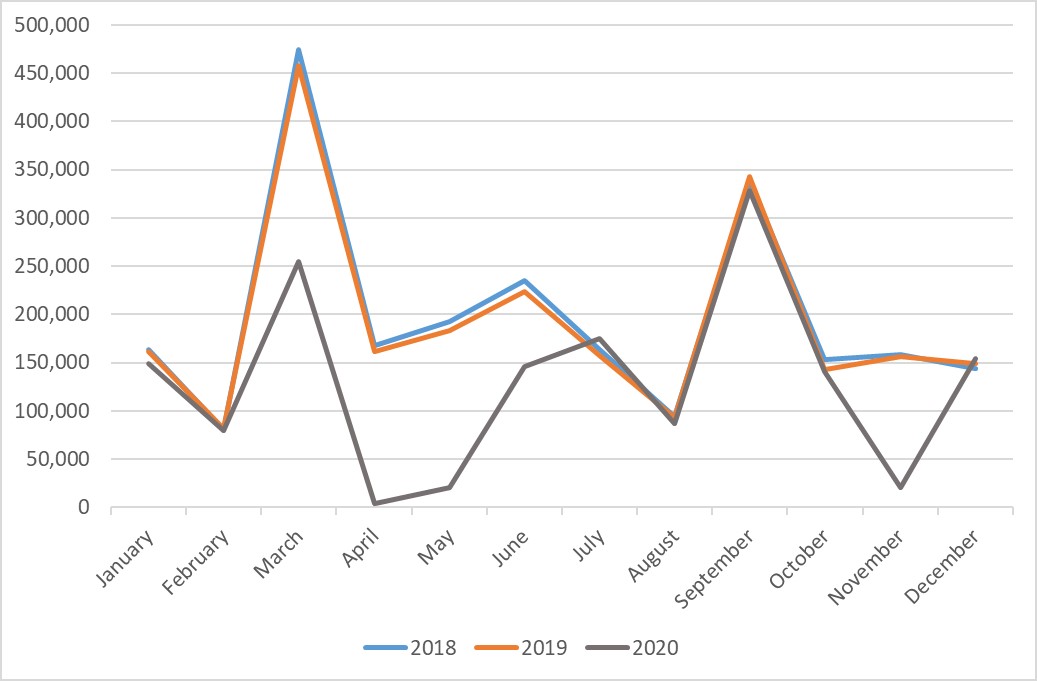UK sees registrations drop as it enters second lockdown
05 November 2020

5 November 2020
The UK has seen its weakest October registrations performance for nine years, as a ′firebreak’ lockdown in Wales hindered sales of new vehicles and contributed to a 1.6% drop in the market.
The latest data, provided by the Society of Motor Manufacturers and Traders (SMMT), shows that 140,945 units were registered last month, making it the weakest October since 2011 and 10.1% lower than the average recorded over the last decade, according to the industry body.
The arrival of new models and ongoing financial incentives around battery-electric vehicles (BEVs) helped initially to sustain UK demand in the month, but the introduction of a lockdown in Wales on 23 October contributed to the nation recording 25.5% fewer registrations by the end of the month, which accounted for more than half of the overall UK decline.
 Source: SMMT
Trouble ahead
Year-to-date, the market is down by 31%, according to the SMMT, with 620,921 fewer vehicles on the road. However, the UK is now in a month-long lockdown period that will see all but essential services closed – including car dealership showrooms. This means that only registrations made up until 5 November, when the lockdown started, will count in the November figures, and the SMMT’s expectation is in line with Autovista Group’s predictions that this month will see 100,000 fewer vehicles registered in the country as a result.
′When showrooms shut, demand drops, so there is a real danger that with England today entering a second lockdown, both dealers and manufacturers could face temporary closure,’ comments SMMT chief executive Mike Hawes. ′What is not in doubt, however, is that the entire industry now faces an even tougher end to the year as businesses desperately try to manage resources, stock, production and cashflow in the penultimate month before the inevitable upheaval of Brexit. Keeping showrooms open – some of the most COVID-secure retail environments around – would help cushion the blow but, more than ever, we need a tariff-free deal with the EU to provide some much-needed respite for an industry that is resilient but massively challenged.’
UK new-car registrations, January 2018 to December 2020 (forecast from November 2020)
Source: SMMT
Trouble ahead
Year-to-date, the market is down by 31%, according to the SMMT, with 620,921 fewer vehicles on the road. However, the UK is now in a month-long lockdown period that will see all but essential services closed – including car dealership showrooms. This means that only registrations made up until 5 November, when the lockdown started, will count in the November figures, and the SMMT’s expectation is in line with Autovista Group’s predictions that this month will see 100,000 fewer vehicles registered in the country as a result.
′When showrooms shut, demand drops, so there is a real danger that with England today entering a second lockdown, both dealers and manufacturers could face temporary closure,’ comments SMMT chief executive Mike Hawes. ′What is not in doubt, however, is that the entire industry now faces an even tougher end to the year as businesses desperately try to manage resources, stock, production and cashflow in the penultimate month before the inevitable upheaval of Brexit. Keeping showrooms open – some of the most COVID-secure retail environments around – would help cushion the blow but, more than ever, we need a tariff-free deal with the EU to provide some much-needed respite for an industry that is resilient but massively challenged.’
UK new-car registrations, January 2018 to December 2020 (forecast from November 2020)
 Source: SMMT and Autovista Group
′While the continuation of click & collect and delivery services is welcome, and should help prevent a return to the sales wipe-out experienced in the spring, it cannot offset the loss of custom from the closure of showrooms themselves, given the unique nature of the car purchase process,’ the SMMT said.
Brexit uncertainty also continues to complicate matters. Tariffs of 10% could be added to imports and exports in the event of no free-trade agreement between the UK and European Union. Carmakers are already highlighting their inability to absorb this tariff, meaning they could tag it onto the price of new cars imported into the country.
With dealerships closed in November, this only leaves one month for consumers and businesses to update their vehicles before factoring in any potential cost increase. This may mean that pent-up demand will aid the market in December. However, as this is traditionally a poor-trading month for the automotive industry, with consumer spending concentrated elsewhere, and with an extension to the UK government’s furlough scheme meaning many consumers are economically worse off during lockdowns, pent-up demand is unlikely to drive the market back to pre-lockdown levels.
UK forecast to fall 32%
To this end, Autovista Group is forecasting a 32% drop in registrations in the UK for 2020. The Autovista Group forecast, first published in June, was a downgrade from the 23% decline forecast in May and 20% forecast in April. In March, before the coronavirus (COVID-19) pandemic took hold, the expectation was that the UK market would only experience a 3% fall in 2020.
The UK’s market continues to be driven by alternatively-fuelled vehicle sales, as petrol and diesel models register declines. In October, petrol fell 21.3%, while diesel dropped by 38.4%.
However, BEVs saw a 195.2% increase in registrations, albeit on smaller figures, with 9,335 units hitting the road in October. Year-to-date, BEVs are up 168.7% as new models and improving infrastructure helped 75,946 vehicles roll out of showrooms. Following a decline due to the abolishing of government grants, plug-in hybrids (PHEVs) are also making a comeback. In October, 7,775 units were registered, representing growth of 148.7%, while year-to-date, PHEVs are up 91.5%.
Source: SMMT and Autovista Group
′While the continuation of click & collect and delivery services is welcome, and should help prevent a return to the sales wipe-out experienced in the spring, it cannot offset the loss of custom from the closure of showrooms themselves, given the unique nature of the car purchase process,’ the SMMT said.
Brexit uncertainty also continues to complicate matters. Tariffs of 10% could be added to imports and exports in the event of no free-trade agreement between the UK and European Union. Carmakers are already highlighting their inability to absorb this tariff, meaning they could tag it onto the price of new cars imported into the country.
With dealerships closed in November, this only leaves one month for consumers and businesses to update their vehicles before factoring in any potential cost increase. This may mean that pent-up demand will aid the market in December. However, as this is traditionally a poor-trading month for the automotive industry, with consumer spending concentrated elsewhere, and with an extension to the UK government’s furlough scheme meaning many consumers are economically worse off during lockdowns, pent-up demand is unlikely to drive the market back to pre-lockdown levels.
UK forecast to fall 32%
To this end, Autovista Group is forecasting a 32% drop in registrations in the UK for 2020. The Autovista Group forecast, first published in June, was a downgrade from the 23% decline forecast in May and 20% forecast in April. In March, before the coronavirus (COVID-19) pandemic took hold, the expectation was that the UK market would only experience a 3% fall in 2020.
The UK’s market continues to be driven by alternatively-fuelled vehicle sales, as petrol and diesel models register declines. In October, petrol fell 21.3%, while diesel dropped by 38.4%.
However, BEVs saw a 195.2% increase in registrations, albeit on smaller figures, with 9,335 units hitting the road in October. Year-to-date, BEVs are up 168.7% as new models and improving infrastructure helped 75,946 vehicles roll out of showrooms. Following a decline due to the abolishing of government grants, plug-in hybrids (PHEVs) are also making a comeback. In October, 7,775 units were registered, representing growth of 148.7%, while year-to-date, PHEVs are up 91.5%.
 Source: SMMT
Trouble ahead
Year-to-date, the market is down by 31%, according to the SMMT, with 620,921 fewer vehicles on the road. However, the UK is now in a month-long lockdown period that will see all but essential services closed – including car dealership showrooms. This means that only registrations made up until 5 November, when the lockdown started, will count in the November figures, and the SMMT’s expectation is in line with Autovista Group’s predictions that this month will see 100,000 fewer vehicles registered in the country as a result.
′When showrooms shut, demand drops, so there is a real danger that with England today entering a second lockdown, both dealers and manufacturers could face temporary closure,’ comments SMMT chief executive Mike Hawes. ′What is not in doubt, however, is that the entire industry now faces an even tougher end to the year as businesses desperately try to manage resources, stock, production and cashflow in the penultimate month before the inevitable upheaval of Brexit. Keeping showrooms open – some of the most COVID-secure retail environments around – would help cushion the blow but, more than ever, we need a tariff-free deal with the EU to provide some much-needed respite for an industry that is resilient but massively challenged.’
UK new-car registrations, January 2018 to December 2020 (forecast from November 2020)
Source: SMMT
Trouble ahead
Year-to-date, the market is down by 31%, according to the SMMT, with 620,921 fewer vehicles on the road. However, the UK is now in a month-long lockdown period that will see all but essential services closed – including car dealership showrooms. This means that only registrations made up until 5 November, when the lockdown started, will count in the November figures, and the SMMT’s expectation is in line with Autovista Group’s predictions that this month will see 100,000 fewer vehicles registered in the country as a result.
′When showrooms shut, demand drops, so there is a real danger that with England today entering a second lockdown, both dealers and manufacturers could face temporary closure,’ comments SMMT chief executive Mike Hawes. ′What is not in doubt, however, is that the entire industry now faces an even tougher end to the year as businesses desperately try to manage resources, stock, production and cashflow in the penultimate month before the inevitable upheaval of Brexit. Keeping showrooms open – some of the most COVID-secure retail environments around – would help cushion the blow but, more than ever, we need a tariff-free deal with the EU to provide some much-needed respite for an industry that is resilient but massively challenged.’
UK new-car registrations, January 2018 to December 2020 (forecast from November 2020)
 Source: SMMT and Autovista Group
′While the continuation of click & collect and delivery services is welcome, and should help prevent a return to the sales wipe-out experienced in the spring, it cannot offset the loss of custom from the closure of showrooms themselves, given the unique nature of the car purchase process,’ the SMMT said.
Brexit uncertainty also continues to complicate matters. Tariffs of 10% could be added to imports and exports in the event of no free-trade agreement between the UK and European Union. Carmakers are already highlighting their inability to absorb this tariff, meaning they could tag it onto the price of new cars imported into the country.
With dealerships closed in November, this only leaves one month for consumers and businesses to update their vehicles before factoring in any potential cost increase. This may mean that pent-up demand will aid the market in December. However, as this is traditionally a poor-trading month for the automotive industry, with consumer spending concentrated elsewhere, and with an extension to the UK government’s furlough scheme meaning many consumers are economically worse off during lockdowns, pent-up demand is unlikely to drive the market back to pre-lockdown levels.
UK forecast to fall 32%
To this end, Autovista Group is forecasting a 32% drop in registrations in the UK for 2020. The Autovista Group forecast, first published in June, was a downgrade from the 23% decline forecast in May and 20% forecast in April. In March, before the coronavirus (COVID-19) pandemic took hold, the expectation was that the UK market would only experience a 3% fall in 2020.
The UK’s market continues to be driven by alternatively-fuelled vehicle sales, as petrol and diesel models register declines. In October, petrol fell 21.3%, while diesel dropped by 38.4%.
However, BEVs saw a 195.2% increase in registrations, albeit on smaller figures, with 9,335 units hitting the road in October. Year-to-date, BEVs are up 168.7% as new models and improving infrastructure helped 75,946 vehicles roll out of showrooms. Following a decline due to the abolishing of government grants, plug-in hybrids (PHEVs) are also making a comeback. In October, 7,775 units were registered, representing growth of 148.7%, while year-to-date, PHEVs are up 91.5%.
Source: SMMT and Autovista Group
′While the continuation of click & collect and delivery services is welcome, and should help prevent a return to the sales wipe-out experienced in the spring, it cannot offset the loss of custom from the closure of showrooms themselves, given the unique nature of the car purchase process,’ the SMMT said.
Brexit uncertainty also continues to complicate matters. Tariffs of 10% could be added to imports and exports in the event of no free-trade agreement between the UK and European Union. Carmakers are already highlighting their inability to absorb this tariff, meaning they could tag it onto the price of new cars imported into the country.
With dealerships closed in November, this only leaves one month for consumers and businesses to update their vehicles before factoring in any potential cost increase. This may mean that pent-up demand will aid the market in December. However, as this is traditionally a poor-trading month for the automotive industry, with consumer spending concentrated elsewhere, and with an extension to the UK government’s furlough scheme meaning many consumers are economically worse off during lockdowns, pent-up demand is unlikely to drive the market back to pre-lockdown levels.
UK forecast to fall 32%
To this end, Autovista Group is forecasting a 32% drop in registrations in the UK for 2020. The Autovista Group forecast, first published in June, was a downgrade from the 23% decline forecast in May and 20% forecast in April. In March, before the coronavirus (COVID-19) pandemic took hold, the expectation was that the UK market would only experience a 3% fall in 2020.
The UK’s market continues to be driven by alternatively-fuelled vehicle sales, as petrol and diesel models register declines. In October, petrol fell 21.3%, while diesel dropped by 38.4%.
However, BEVs saw a 195.2% increase in registrations, albeit on smaller figures, with 9,335 units hitting the road in October. Year-to-date, BEVs are up 168.7% as new models and improving infrastructure helped 75,946 vehicles roll out of showrooms. Following a decline due to the abolishing of government grants, plug-in hybrids (PHEVs) are also making a comeback. In October, 7,775 units were registered, representing growth of 148.7%, while year-to-date, PHEVs are up 91.5%.